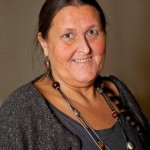IMER seminar in collaboration with Centre on law and social transformation (Note time: 12.15- 14.00 Tuestday 25th of November – UNI Rokkansenteret)
 For Norway, deporting irregular migrants is currently among the highest political priorities, and never before have so many deportations taken place – with 7100 forced returns an all-time high is expected to be reached in 2014. In this presentation, Janmyr will discuss one of the oldest instruments used by states to control migratory flows – readmission agreements. Such agreements typically assist in overcoming bilateral difficulties by setting out reciprocal obligations on the contracting parties to facilitate the return of persons who do not fulfil the Continue reading
For Norway, deporting irregular migrants is currently among the highest political priorities, and never before have so many deportations taken place – with 7100 forced returns an all-time high is expected to be reached in 2014. In this presentation, Janmyr will discuss one of the oldest instruments used by states to control migratory flows – readmission agreements. Such agreements typically assist in overcoming bilateral difficulties by setting out reciprocal obligations on the contracting parties to facilitate the return of persons who do not fulfil the Continue reading




